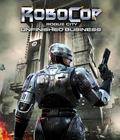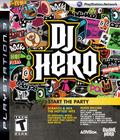DJ Hero is the best music simulation game ever created.
Yes, you read that correctly, and it's even true when compared with some of the most entertaining music games, notably the Guitar Hero and Rock Band franchises — but hardly limited to these genre juggernauts. The key word here is "simulation." As music games go, DJ Hero is as close as you'll get to the real thing. Surely drumming in Rock Band and Guitar Hero World Tour were somewhat simulative experiences, but it is as if all other music title gameplay has been leading up to DJ Hero. Turntablism best suits the kinds of things you can do with games controllers and music. The guitar-based games have all been quite fun, each brand having its strong suits, but holding down buttons representing frets at the same time you depress a long strum bar button is really nothing like playing a guitar. Spinning in DJ Hero is a lot like deejaying. You get tired during long sets and need a break; your enthusiasm waxes and wanes depending on the tracks you're spinning; you'll get confused beat juggling and fading, and then experience the same sort of "recovery moments" real DJs sometimes enjoy. DJ Hero is very, very real. I had to tape up my scratching thumb. It was only one thumb, as the DJ Hero controller features only one turntable, but still.
It's easy to argue that as the game's mixes are predetermined, the game can't be that real, as you aren't really deejaying or truly creating your own turntable artistry as you play. That's true to a great degree, but there are options for customizing your creations while you're spinning — yet this is after all a game. When it comes right down to it, it doesn't matter that you're merely following orders set forth by the already-created set lists. Especially on the higher difficulty settings, it's nearly as frenzied as if you were creating your own mixes on the fly and trying to keep everybody out on the floor.
The issue of cost comes into play when considering DJ Hero. It retails for $120 in the U.S., and that's no patsy price for one game and one controller. I, like almost everyone save Activision, believed no matter how the game turned out, $120 was just too much. Well, I was wrong. I'm sure Activision is making a nice chunk of change on the game/controller bundle, but they wisely spared no expense in crafting the wireless controller peripheral. It's put together better than a mid-range Numark USB controller for computer-based DJ software, a $250 device. Of course, the DJ Hero controller doesn't control real DJ software. Not yet, anyway. This thing, like guitar-game controllers spawning various freeware computer drivers, is destined to get some sort of underground support as a USB controller for some type of available DJ software. It's that solid, that durable, that well-designed and that much of a pleasure to use. Since it is indeed a game controller for a specific game, it will always be limited in what it can do even if hobbyists do make computer drivers, but purely as the DJ Hero game controller, I can find no fault with it whatsoever. For your $120, you will not feel the least bit gouged by the high price to play.
The controller layout is simple. First off, you'll notice the two halves, on the one side the turntable controller and on the other the fader, effects knob, Euphoria trigger button and standard PS3 controls thoughtfully hidden behind a flip-up panel. The halves can be swapped around for right- or left-handed play. You'll probably want to configure the game according to your handedness, but as some people are in certain tasks a bit ambidextrous, if you're uncomfortable with the setup for your usual handedness, you may wish to try it the other way around.
On the rugged turntable platter are three buttons, familiar to anyone who's every seen a fret button in a guitar game. Brilliantly, the game designers have allowed for configuring not only the handedness of the whole setup, but a right- or left-side position of the controller buttons on the turntable. I naturally went for the right-side position, which turned out to be perfect for me; I tried the left-side and found it more awkward. For everyone, preference will vary, but the great thing here is the designer's foresight to allow the preferred orientation.
Gameplay, as taught by a very enthusiastic and endearing Grandmaster Flash via in-game tutorials, is extremely straightforward, quite simple in all the basic functions. DJ Hero, like various board and card games, can be described as taking a moment to learn, yet a lifetime to master. Just as in games based on other instruments, note graphics come at you down an on-screen track, crossing a bar, at which time you need to press the appropriately colored button set into the turntable. For starting up tracks and basic beat-juggling, that's all you need: button taps. Some graphics on the button tracks indicate you must scratch and rapidly move the turntable under the buttons back and forth, all while you hold down the note button. The motion of the turntable is smooth and sturdy; it's easy to scratch, but be advised that it's not easy to scratch continually over numerous sets. It'll wear you out, even on the easy difficulty setting. You'll never have more fun at a game wearing you out, but it's definitely about as athletic as you can get in games this side of a Wii sports title.
Typical of music games, at higher difficulty settings there are more notes, and in the particular case of DJ Hero, the fader becomes an integral part of gameplay. Unlike real faders on mixing panels, this fader has only three functional positions: left, right and center. DJ Hero is fairly forgiving of exact position, too. As the fades come up in gameplay, represented by deviations of the note lines, you're expected to get the slider mostly right or left, then mostly all the way back to the center, or perhaps all the way to the far side fader position. Higher difficulty settings are less tolerant, but generally the game is extremely fair, making it an even better music simulation. In deejaying, mixing the audio from two different records, the precise position of the fader isn't terribly important so long as the track you want to significantly dominate does indeed dominate. With a real DJ deck, having the fader slightly off center, or off full left or right channel, doesn't usually matter, and if it does, if you really are spinning wax, you have a chance to make a quick adjustment that your audience will barely hear, if they notice at all.
In some sections the middle track, controlled by the center red button on the turntable, lets you add samples over your performances from preselected sets, while the effects knobs allows you to pick particular samples of that group. Some work poorly, some wonderfully, in adding to the music; but, again, it's quite simulative. It's up to you to pick the best sound and tap it out to the beat or hold it down for the most harmonious or nifty effect. In certain highlighted note runs, the effects knobs can be used to apply freestyle effects to the tracks. It sounds more or less like a stock flanger, and in fact it may be just that, but playing around with it, you can get some cool effects, and properly freestyling temporarily increases your score modifier.
Like most music games, DJ Hero features an "energy" element, termed Euphoria, that you build up by perfectly completing short sections of the tracks and then triggering at the right moments to double your score modifier. It works as you'd expect: the better you plan for using Euphoria, the longer your double-score runs, the higher your final scores and star-count rating per track. Euphoria is triggered with a button to the left of the effects knob; in addition to a couple of on-screen indicators, it helpfully glows red when Euphoria can be used, but don't you dare look down, especially at the higher difficulty settings. Euphoria also automates the fades at higher difficulty settings, and you'll appreciate the brief respite.
My absolute favorite feature of DJ Hero is the rewind scheme. Hit enough notes without missing one, and you get a rewind, which allows you to spin the turntable backward and replay a sequence of notes for extra points. Some players may find the rewind feature frustrating at first. You can't spin the thing like a top; the idea is to flip the turntable around one revolution and get those note buttons right back under your fingers, all without looking down. Once you get the hang of it, it's a lot of fun, and it's impressive to watch someone pull off a clean rewind. DJ Hero is also reasonably forgiving when you miss the first note at the start of a rewound section; the additional tolerance is another wise decision from the game's designers. (Rewinds are not available in turntable/guitar-controller duets, whether automated or playing with a friend using a real guitar controller, and I'm not sure why. I think the guitar player could handle the rewinds, if not trigger them. It might add an interest element of wariness for the guitar player.)
The set lists are pretty well mixed, but they do tend a lot toward the contemporary club mixes of today: hip-hop, urban R&B and soul. If that's not your thing, keep an open mind. Some of my favorite set lists turned out to be comprised of tracks I'd otherwise have shown little interest in. All the mixes are nicely done, though some will certainly appeal to different tastes better than others. For me, the eight-song Daft Punk set list would likely be worth the price of entry all by itself. Others will have their own favorites, and there's bound to be plenty of downloadable content on the way — in fact, the first DLC mixes were released on the same day as the game's release.
DJ Hero supports online play, leaderboards and Trophies — all the things you'd expect in a contemporary top-tier PS3 game — but the most significant thing about this title is how wildly original it is in a genre that I was sure was by now was completely saturated and becoming staid. As an experiment, during review gameplay of DJ Hero, I went back and played some Guitar Hero and Rock Band, and I found them significantly lackluster in comparison. In the guitar games, as much as I may like some of the music, I know I'm not really playing a single note. In DJ Hero, I really do get the distinct sense that I'm spinning for a full house. This title will appeal to both casual and core gamers alike, with a beginner's mode even toddler children can play fairly well and enjoy. On the other end of the spectrum, the higher difficulty levels are enough to drive you insane — or keep you regularly playing DJ Hero for a couple of years.
Score: 9.5/10
More articles about DJ Hero











 DJ Hero expands Guitar Hero's signature social gaming to all-new consumers with the addition of diverse music genres including hip-hop, R&B, Motown, electronica and dance. An all-new turntable controller transforms players into DJs by creating original mixes of popular songs and music from the world's most exciting artists and DJs.
DJ Hero expands Guitar Hero's signature social gaming to all-new consumers with the addition of diverse music genres including hip-hop, R&B, Motown, electronica and dance. An all-new turntable controller transforms players into DJs by creating original mixes of popular songs and music from the world's most exciting artists and DJs.




























